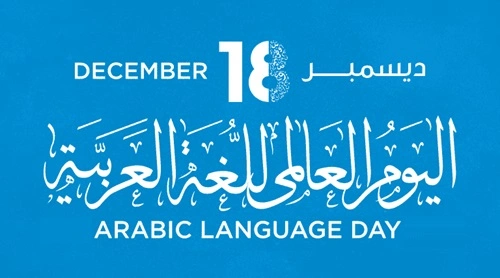Arabic Language Day, celebrated annually on December 18, is an observance established by the United Nations Educational, Scientific, and Cultural Organization (UNESCO) to highlight the historical, cultural, and linguistic significance of the Arabic language. This day not only honors the rich legacy of Arabic but also promotes multilingualism and cultural diversity around the world.
Arabic, one of the six official languages of the United Nations, has played a pivotal role in shaping civilizations, fostering knowledge exchange, and enriching global heritage. Here’s an in-depth look at the origins, significance, and celebrations of Arabic Language Day.

History and Origins
The origins of Arabic Language Day date back to 2010, when UNESCO designated December 18 as a day to celebrate the Arabic language. This date marks the anniversary of 1973, when the United Nations General Assembly adopted Arabic as its sixth official language, alongside English, French, Spanish, Russian, and Chinese.
Arabic is one of the most widely spoken languages in the world, with over 400 million speakers across more than 25 countries, making it a cornerstone of global communication and culture. UNESCO’s recognition of this day underscores the importance of linguistic diversity and the role of languages in fostering dialogue, understanding, and unity.
The Significance of the Arabic Language
Arabic holds a unique place in the world due to its historical, cultural, and religious significance:
1. A Language of Culture and Civilization
Arabic has been a vehicle for some of humanity’s greatest intellectual achievements. It served as a bridge for knowledge exchange during the Golden Age of Islam (8th–14th centuries), with Arabic-speaking scholars making significant contributions to fields such as mathematics, astronomy, medicine, philosophy, and literature.
2. A Sacred Language
Arabic is the language of the Qur’an, the holy book of Islam, making it deeply revered by over 1.9 billion Muslims worldwide. This religious significance has contributed to its widespread use and preservation over centuries.
3. Linguistic Richness
Arabic is renowned for its complex grammar, rich vocabulary, and poetic rhythm. It has given rise to an extraordinary literary tradition, including classical poetry, philosophical texts, and modern novels.
4. Global Influence
As a United Nations official language, Arabic plays a vital role in diplomacy, global communication, and international relations.
Themes of Arabic Language Day
Each year, UNESCO chooses a specific theme for Arabic Language Day to highlight different aspects of the language and its contributions to society. Themes in recent years have included:
- 2022: “The Contribution of the Arabic Language to Human Civilization and Culture.”
- 2021: “Arabic Language: A Bridge Between Civilizations” – Emphasizing the role of Arabic in fostering dialogue and cultural exchange.
These themes guide discussions, campaigns, and initiatives, focusing on the importance of preserving and promoting the Arabic language in an ever-globalizing world.
Challenges Facing the Arabic Language
Despite its global importance, the Arabic language faces several challenges:
1. Dialect Diversity
Arabic exists in two primary forms:
- Classical Arabic, used in religious and historical texts.
- Modern Standard Arabic (MSA), used in media, education, and formal communication.
Additionally, there are numerous regional dialects that vary significantly, sometimes creating barriers to mutual understanding.
2. Digital Representation
Arabic’s presence in the digital space is growing but still lags behind other major languages. Limited availability of Arabic content online and challenges in digitizing the script pose hurdles.
3. Education and Preservation
In some regions, the teaching of Arabic is declining due to the adoption of other languages in education systems, threatening the preservation of the language.
4. Globalization
The dominance of English and other languages in international trade, science, and technology creates challenges for the prominence of Arabic in global contexts.
How Arabic Language Day is Celebrated
Arabic Language Day is celebrated worldwide through a variety of activities and initiatives that promote the language’s beauty and significance:
1. Cultural Events
Exhibitions, poetry readings, and music performances showcase the richness of Arabic art, literature, and heritage.
2. Educational Workshops
Schools, universities, and language institutes organize workshops, lectures, and competitions to encourage learning and appreciation of Arabic.
3. Media Campaigns
Social media campaigns, documentaries, and TV programs highlight the contributions of Arabic to global culture and its relevance in today’s world.
4. International Conferences
Scholars, linguists, and cultural leaders gather to discuss issues related to the preservation, teaching, and promotion of Arabic.
5. Community Engagement
Local organizations host language classes, storytelling sessions, and interfaith dialogues to foster appreciation for Arabic among non-native speakers.
Global Efforts to Promote Arabic
Various organizations and initiatives are working to preserve and promote Arabic:
1. UNESCO’s Role
UNESCO advocates for the preservation of Arabic through programs that emphasize its role in cultural heritage, education, and sustainable development.
2. Digitalization Initiatives
Tech companies and educational organizations are working to increase Arabic-language resources online, making it more accessible to global audiences.
3. Academic Programs
Universities worldwide offer Arabic language and literature programs, fostering interest among non-native speakers.
4. Cultural Diplomacy
Countries in the Arab world actively promote Arabic through cultural exchange programs, art festivals, and literature translation initiatives.
How You Can Celebrate Arabic Language Day
Whether you are an Arabic speaker or someone interested in the language, there are many ways to celebrate Arabic Language Day:
- Learn Arabic: Take a step toward learning the basics of the language or expanding your knowledge of its grammar and vocabulary.
- Read Arabic Literature: Explore the works of iconic Arabic writers such as Naguib Mahfouz, Khalil Gibran, or Mahmoud Darwish.
- Promote Arabic Online: Share posts, videos, or articles about the language on social media to raise awareness.
- Engage with Arabic Culture: Watch Arabic films, listen to traditional music, or try your hand at Arabic calligraphy.
- Support Preservation Efforts: Donate to or volunteer with organizations dedicated to preserving Arabic culture and heritage.
Looking Ahead: The Future of Arabic
As the world becomes more interconnected, the role of Arabic in fostering dialogue and understanding between cultures remains essential. Efforts to integrate Arabic into the digital realm, expand its teaching globally, and celebrate its contributions to human civilization will ensure its continued relevance for future generations.
Conclusion
Arabic Language Day is a celebration of one of the world’s most influential languages, honoring its historical contributions and cultural richness. It serves as a reminder of the importance of linguistic diversity and the role of languages in bridging divides and fostering mutual understanding. Let us use this day to appreciate the beauty of Arabic, support its preservation, and promote its continued growth as a cornerstone of global heritage.

